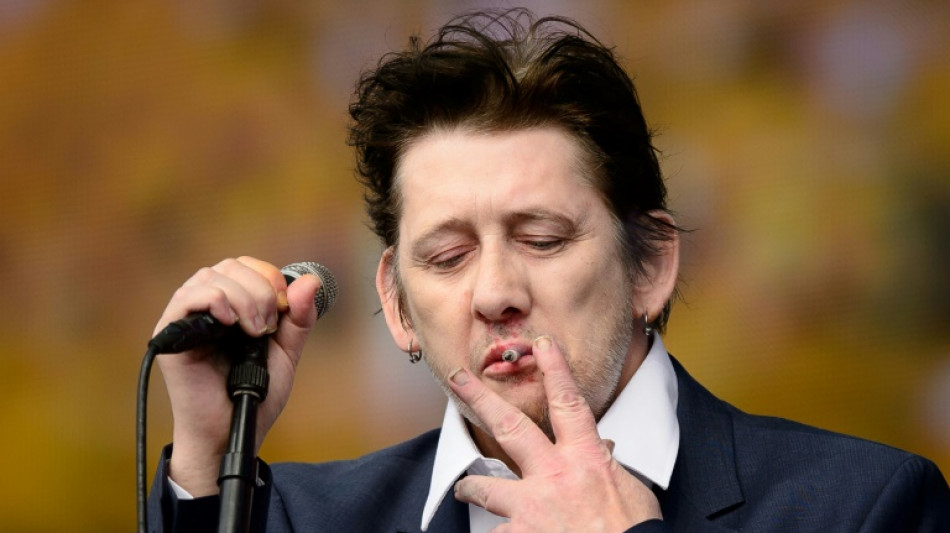

Shane MacGowan: laureate of lowlife folk-punk
Shane MacGowan, the singer-songwriter who fronted Celtic folk-punk band The Pogues, was a booze-fuelled bard who performed defiant ballads of the downtrodden and doomed.
He died on Thursday aged 65, although many would have been forgiven for wondering how he made it that far.
MacGowan seemed like a character from his own songbook and was renowned for his dishevelled appearance, sparsely toothed mouth and often-slurred stage performances.
His lyrics gave a tender and profane voice to the experiences of the Irish and the Irish diaspora, framed in a rousing pub-anthem style.
The Pogues -- named after the Irish Gaelic phrase "póg mo thóin" ("kiss my arse") -- carried MacGowan to fame before jettisoning him over the alcohol and drug abuse that dogged much of his life.
His 1987 Christmas "Fairytale of New York" duet with Kirsty MacColl, recounting a skid-row romance, is a festive staple, its ragamuffin charm standing out against syrupy standards.
"The Body of an American", released a year earlier, featured in hit television series "The Wire" at the whiskey sodden wakes of fallen officers of the Baltimore Police Department.
"From his concrete-mixing voice that is by turns incoherent and lyrical, and his devil-may-care lifestyle to the rough tenderness of his worldview, he is the original death-or-glory anti-hero," wrote critic Liam Fay.
- Punk in waiting -
Although considered quintessentially Irish, Shane Patrick Lysaght MacGowan was born in England to Irish parents on December 25, 1957.
He claimed that as a five year-old he was given two bottles of Guinness a night.
The teenage MacGowan won a scholarship at London's elite Westminster School but was expelled after being caught in possession of drugs.
At 17, he found himself in rehab with a valium problem.
MacGowan came of age in the London punk scene, going by the name "Shane O'Hooligan" -- aping the pseudonymous style of Johnny Rotten, Sid Vicious and Billy Idol.
His first band was The Nipple Erectors before The Pogues were formed in 1982.
The band's name was originally Pogue Mahone -- the anglicised form of the Irish insult.
But the moniker was swiftly shortened after the BBC got wind that radio DJs were issuing an indecent proposal with each mention of the band.
- Commercial success -
The Pogues' first album was 1984's "Red Roses for Me".
Their second, "Rum, Sodomy & The Lash", came one year later, and was described by Spin magazine as containing "some of the purest toothless lyricism in punk-rock history".
The band's success came in the midst of "The Troubles" sectarian conflict in Northern Ireland and as an upstart punk group, The Pogues had a distinctly political edge.
Their 1988 song "Streets of Sorrow/Birmingham Six" recounted the plight of six Irishmen wrongly imprisoned for deadly bombings at two pubs in the central English city.
The Irish Republican Army (IRA) were widely suspected of perpetrating the 1974 attack that killed 21 and left scores more injured.
"They're still doing time/For being Irish in the wrong place/And at the wrong time," MacGowan sang.
The tune fell foul of a UK government ban that covered the broadcast of the voices of pro-Irish republican paramilitaries and their political representatives.
However the band was vindicated in 1991 when all six men saw their convictions quashed on appeal, in what remains one of Britain's worst miscarriages of justice.
- Substance issues -
The Pogues' hedonistic heydays were regularly hamstrung by MacGowan's erratic, drink-fuelled behaviour.
He was ejected from the group in 1991 -- three years after their highest charting album "If I Should Fall from Grace with God".
In 2004, MacGowan said he "was glad to get out alive".
He continued performing with a new group as Shane MacGowan and The Popes, before rejoining The Pogues on stage for a time.
However his public reputation remained sealed as a heavy-drinking, drug-using rebel.
In 2016, MacGowan's wife Victoria reported he was finally sober, if a shadow of his former self, and even had his trademark rotten teeth restored.
The dentist responsible, Darragh Mulrooney, gave the singer 28 teeth on a titanium frame in a procedure that took nine hours and was dubbed "the Everest of dentistry".
In recent years, MacGowan struggled with poor health, and used a wheelchair after breaking his pelvis in a fall in 2015.
In January 2023 he confirmed he had the brain condition encephalitis, which led to several stays in hospital intensive care.
O.F.MacGillivray--NG



